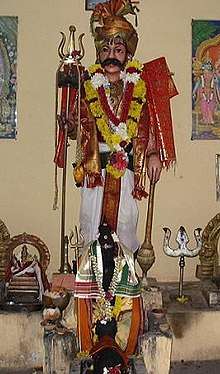Muneeswarar
Muneeswarar (also spelled Munīswara or Munīshwaran) is a Hindu god who is worshipped as a family deity in most Shaivite families in the Indian states of Andhra Pradesh, Tamil Nadu, Maharashtra and Karnataka. His name is a combination of "Muni", meaning saint, and "Īshwara", meaning Shiva, the highest of Hindu gods.[1]
| Muneeswarar | |
|---|---|
 | |
| Weapon | Trishūla, gada, sword |
| Mount | Horse |
Worship
Muneeswarar is worshipped in Karnataka, Chittoor district of Andhra Pradesh, Gudiyattam of Vellore district, and the northern part of Tamil Nadu in India, and in Trinidad and Tobago, Guyana, and Suriname, where there are many temples dedicated to him. There are many small temples in the Central Province of Sri Lanka, where many Tamil-speaking people live. During the British colonial period, people brought the deity to Sri Lanka.
Since his weapon is the trident, Muneeswarar temples contain a trident placed in the ground. Limes are often placed on the prongs of the trident. In most villages in India, the deity is a laid stone. When statues of Muneeswarar are used, they are painted with bright colors, in contrast to the black granite statues in other Indian temples. His statue is dressed in a dhoti, unlike the statues of other gods.
Muneeswarar is generally worshipped either as a fierce god or a peaceful god; those who worship his fierce form offer him animals like lamb and chicken.
See also
References
- "Brahma, Vishnu, Shiva, the Highest Gods of Hinduism". www.hinduwebsite.com. Retrieved 2020-05-15.
External links
- Muniswarar.com - Online Ayya Temple
- http://www.ruthrakali.org.sg/htmlfiles/muneeswaran.htm
- Anbe Muneeswarar - site with a lot of information about Sri Muneeswarar
- http://www.indiadivine.org/audarya/shakti-sadhana/445079-not-kateri-parmeshwari-dee-mata-2.html
- https://makemyservice.net/category/spiritual/